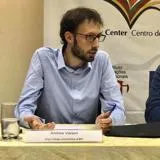
Biography
Andrea Varsori is a PhD candidate in the Department of War Studies, King’s College London, researching criminal and paramilitary groups in urban Brazil. Since February 2018, he is the Editor-in-Chief of Strife, the Journal and Blog of the students and researchers of the Department of War Studies; since October of that year, he is also one of the Coordinators of the Urban Violence Research Network, a network of academic and public sector researchers aiming at encouraging cross-border and cross-disciplinary dialogue on issues of violence and security in cities.
During his PhD, Andrea has twice been a Visiting Fellow in Brazilian institutions: first in 2017 at the BRICS Policy Center, a think-tank created by a partnership between the Rio de Janeiro Town Hall and PUC-Rio’s International Relations Institute, and then in 2018 at the International Relations Institute of the University of São Paulo.
A native of Veneto, prior to attending King’s College Andrea has worked as a full-time intern at the Bruno Leoni Institute, one of Italy’s most influential public policy think-tanks. He has obtained his MA in International and Diplomatic Sciences and his BA in International Relations at the University of Bologna, Italy.
Doctoral Research
Adapting to Survive. The Evolution of Violent Non-State Actors in Rio de Janeiro and São Paulo
My thesis aims at explaining why state repression of violent non-state actors in Rio de Janeiro and São Paulo has been unsuccessful so far. These groups have existed for decades, clashing several times with police forces and causing consistently high murder rates. Since at least the 1990s, they have achieved extensive dominance of informal neighbourhoods in Rio and prisons in São Paulo. Their presence has been highly visible. Authorities have carried out multiple attempts at repressing them, including an expensive project of community policing in some of their most important territories in Rio. Yet, as of now, drug trafficking alliances and paramilitary groups have survived and carried on their economic and military activities. This thesis seeks to explain their continuing resilience by focusing on change over time in each of these groups. The attempt is thus to design an evolutionary and ecological study of the non-state armed actors operating in Rio and São Paulo, drawing inspiration from the main concepts in the fields of ecology and evolutionary biology. The thesis will show how these groups changed over time in their structure, territoriality, and relations. The changes were of a different nature in these two megacities. While the hegemonic criminal organisation in São Paulo carried on an explicit attempt at achieving dominance over prisons, in Rio criminal groups underwent unconscious, unplanned adaptations that made them increasingly resilient to state repression. The thesis outlines what these adaptations are and their significance in enhancing group survival. It does so by reconstructing group history through news sources and the secondary literature; by exposing the data that I collected during my fieldwork, in particular interviews with high-ranking police officers and anonymous denounces; and by studying particular emblematic cases in depth through news articles and social media posts.
Research Interests
Urban violence, urban insurgencies, organized crime, drug trafficking, Brazil, violent non-state actors
Supervisors
Professor David Betz (first supervisor)
Dr Neville Bolt (second supervisor)
